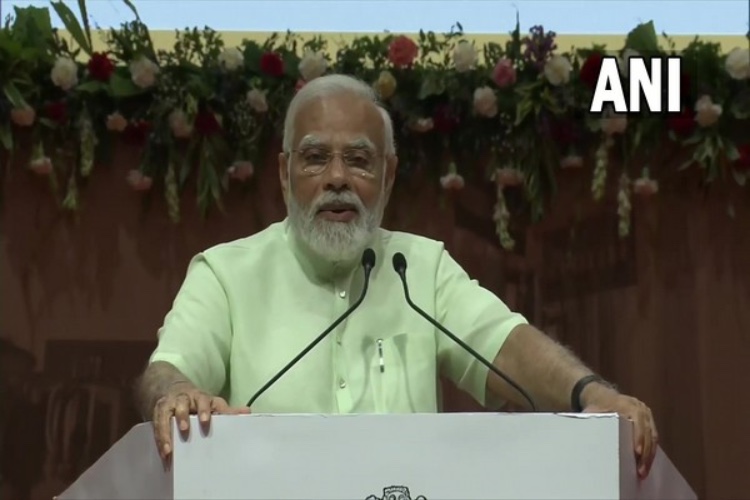
Gandhinagar
Noting that the government did not let any crisis of fertilizer take shape in India even as prices have gone up in the international market due to COVID-19 pandemic and Ukraine situation, Prime Minister Narendra Modi said on Saturday said "the government has faced difficulties but has not allowed the farmers to suffer".
Addressing the seminar of leaders of various cooperative institutions on 'Sahakar Se Samriddhi' at Mahatma Mandir here after inaugurating the Nano Urea (Liquid) Plant constructed at IFFCO, Kalol, the Prime Minister said cooperation is a great medium for the self-sufficiency of the village. Talking about the import dependence with regard to urea and phosphate and potash-based fertilizers, the Prime Minister dwelled on high prices and lack of availability in the global market due to the pandemic and the Ukraine conflict. The Prime Minister said that the "sensitive" government did not allow the problems to be passed on to the farmers and despite the difficult situation did not let any crisis of fertilizer take shape in India.
The Union Government gave a subsidy of Rs 1.60 lakh crore last year and this is going to be more than Rs 2 lakh crore, the Prime Minister added "India imports urea from abroad, in which a 50 kg bag of urea costs Rs 3,500. But in the country, the same urea bag is given to farmers for only Rs 300. Our govt bears a load of Rs 3,200 on a bag of urea. We've tried to face all the difficulties but not let our farmers suffer," he said.
The Prime Minister said that India is the second-biggest consumer of fertilizers and third-biggest producer of fertilizer. Attacking the Congress-led UPA government, he said that seven-eight years ago, the majority of urea "could not reach our farms and was destroyed due to black marketing". "Urea factories were shut because of a lack of new technologies. After the formation of our govt in 2014, we did 100% neem coating of urea. This ensured that the farmers of the country got enough urea. We did the work of restarting 5 closed fertilizer factories in UP, Bihar, Jharkhand, Odisha and Telangana," he said.
Gujarat Chief Minister Bhupendrabhai Patel, Union Ministers Amit Shah and Dr Mansukh Mandaviya were among those present. The Prime Minister said cooperatives has the energy of AtmaNirbhar Bharat. He said Mahatma Gandhi and Sardar Patel showed the way for bringing self-sufficiency to villages and the government is moving ahead on the path of developing a model cooperative village. Six villages in Gujarat have been chosen where all the cooperative-related activities would be implemented, he said.
Referring to Nano Urea (Liquid) Plant constructed at IFFCO, Kalol, he said the power of a full sack of urea has come into a half-litre bottle, leading to huge savings in transportation and storage. The plant will produce about 1.5 lakh bottles of 500 ml per day. The Prime Minister said eight more such plants will be established in the country in the coming days.
"This will reduce foreign dependence with regard to urea and will save the country's money. I am confident that this innovation will not remain confined to urea. In the future, other nano fertilizers will be available to our farmers", he said. The Prime Minister said that in the last 8 years, the government has worked on both the immediate and long-term solutions to the problems being faced by the country.
He cited solutions like improving health infrastructure to deal with any further pandemic shock, Mission Oil Palm to tackle edible oil problems, bio-fuel and hydrogen fuel to handle oil problems and noted that natural farming, and nanotechnology push are also results of this approach. He said there is a solution to many of India's difficulties in self-reliance. He cited co-operative as a great model of self-reliance. The Prime Minister informed that the Government is continuously moving forward to connect the spirit of cooperation with the spirit of the Amrit Kaal.
With this objective, a separate ministry for cooperatives was formed at the Centre. He added that efforts are being made to encourage a cooperative-based economic model in the country. "The greatest strength of cooperatives is the faith, cooperation, and enhancing the capability of the organization with collective strength. This is the guarantee of India's success during the Amrit Kaal," he added.
He said small farmers are being empowered in every way and small-scale industries and MSMEs are being made a strong part of India's self-reliant supply chain. "I am sure that cooperation will help us in realizing our goals and India will move ahead on the road of success and prosperity", the Prime Minister said.
